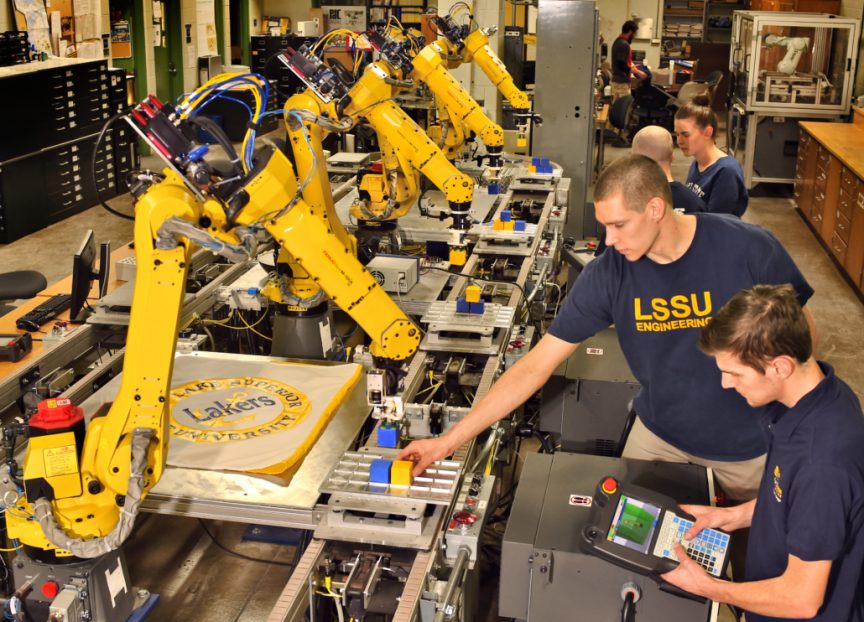For nearly three decades LSSU has been the only university in the nation to offer an industrial robotics concentration or minor within its engineering and engineering technology degree portfolio. With this full-fledged baccalaureate in robotics engineering, LSSU graduates will command more career options and greater salaries.
Like the bachelor degrees that LSSU already offers in mechanical, electrical, and computer engineering, robotics engineering will build upon a solid foundation of courses in mathematics, sciences, English, humanities and the social sciences. All classes will be taught by full-time faculty members in small class settings, with students enjoying numerous opportunities to work hands-on in lab courses.
“The strength and focus of our program is in industrial robotics,” said Paul Weber, chair of LSSU’s School of Engineering and Technology. “We already offer specific specializations in areas like programmable logic controllers, machine vision, industrial robotics systems integration, design and simulation of robotics and manufacturing systems, and industrial robot safety and risk assessment that other programs do not. With the creation of this program, we will expand and strengthen a number of these areas and are excited about new opportunities in collaborative, service, and mobile robotics.”
LSSU’s Robotics and Automation Laboratory is recognized by the Technology Accreditation Commission of ABET – an international engineering accrediting body – as one of the most complete and advanced facilities of its kind in the country. The lab houses 15 industrial robots and automation accessories worth at least $2 million, mostly acquired in conjunction with major industrial partners.
We don’t make useful robots, we make robots useful.Robotics Director Jim Devaprasad
Robotics has taken off significantly during the past 10 years, particularly with industrial robotics as well as with mobile and service robotics. The number of robots at work in the US increased from about 180,000 units in 2007, to about 250,000 units in 2017. During the first nine months of 2017, 27,294 orders for robots valued at approximately $1.473 billion were sold in North America, which is the highest level ever recorded in any other year during the same time period.
Almost 400,000 mobile robotics units are expected to be sold between 2018-20, an average annual increase of between 20% and 25%.
A Brookings Institution study finds that Michigan leads the nation with the highest use of industrial robots. The state’s factories use nearly as many robots as the entire West Coast of the United States.
With these emerging realities, Michigan employers are going to be looking for a workforce to leverage the power of robotics in ways not yet imagined. Lake State’s unique blend of size, engineering faculty, and industrial partnerships will train graduates who are up to the challenge.
For more information, visit robotics engineering or contact Laura Bofinger at the School of Engineering and Technology at [email protected] or (906) 635-2207.
About the Author
 John Shibley
John ShibleyPhotographer/Staff Writer
Shibley has been a writer, editor, photographer, and videographer in the public relations office since 1991, except for a five-year stint as hobby and planetary science editor at Astronomy magazine in the mid-90s, where he was a finalist for the American Astronomical Society’s Jonathan Eberhart Planetary Sciences Journalism Award.
